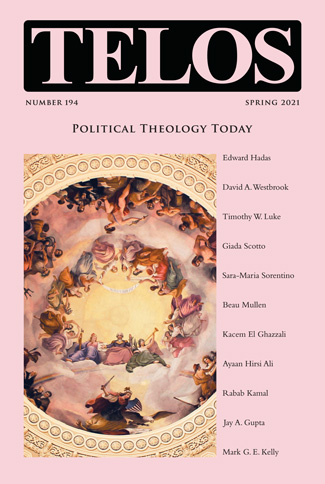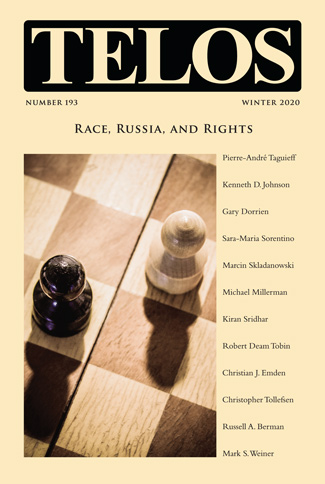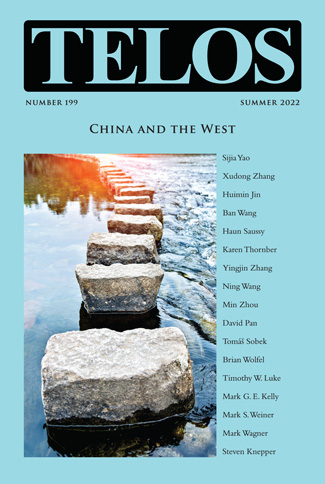 Concerns about inflation can lead us to exaggerate the role of money in the economy. In his essay on “Three Rival Versions of Monetary Enquiry,” in Telos 194, Edward Hadas argues that money is not at the center of economics. Instead, economics is fundamentally about what he calls the “Great Exchange,” in which people offer labor that changes the world and the world in return provides gifts to people in the form of goods and services. At its basis, this exchange involves the relationship between humans and nature, as well as the ways in which humans decide to manage this relationship. Though it can go on with or without money, money is very useful for managing the individual elements of the Great Exchange. As the mediator of the details of the Great Exchange, money is in fact neutral, neither a nefarious underminer of human relations nor a key to prosperity.
Concerns about inflation can lead us to exaggerate the role of money in the economy. In his essay on “Three Rival Versions of Monetary Enquiry,” in Telos 194, Edward Hadas argues that money is not at the center of economics. Instead, economics is fundamentally about what he calls the “Great Exchange,” in which people offer labor that changes the world and the world in return provides gifts to people in the form of goods and services. At its basis, this exchange involves the relationship between humans and nature, as well as the ways in which humans decide to manage this relationship. Though it can go on with or without money, money is very useful for managing the individual elements of the Great Exchange. As the mediator of the details of the Great Exchange, money is in fact neutral, neither a nefarious underminer of human relations nor a key to prosperity.
|
In today’s episode of the Telos Press Podcast, David Pan talks with Mark G.E. Kelly and Timothy W. Luke about the Russian invasion of Ukraine and its consequences for world order. Our current issue, Telos 199 (Summer 2022), features essays by Luke, Kelly, and Pan on the war in Ukraine, excerpts of which appear here. Click through to read the full articles at the Telos Online website (subscription required). To learn how your university can subscribe to Telos, visit our library recommendation page. Print copies of Telos 199 are also available for purchase in our online store.
In today’s episode of the Telos Press Podcast, David Pan talks with Courtney Hodrick about her article “From Neoreaction to Alt-Right: A Schmittian Perspective,” from Telos 198 (Spring 2022). An excerpt of the article appears here. In their conversation they discuss Carl Schmitt’s understanding of the relationship between liberalism and democracy, and how the separation of the two from each other leads to two versions of extreme right thinking; the general outlines of Mencius Moldbug’s rejection of politics in favor of markets and the relationship between this approach and Schmitt’s understanding of politics as based in the friend/enemy distinction; why Moldbug is an example of what Schmitt defines as liberal; how Moldbug’s ideas contrast with those of Richard Spencer and the extent to which Spencer is a Schmittian; and Curtis Yarvin’s recent shift away from his previous rejections of nationalism and whether this shift represents a merging of neoreaction with alt-right populism. If your university has an online subscription to Telos, you can read the full article at the Telos Online website. For non-subscribers, learn how your university can begin a subscription to Telos at our library recommendation page. Print copies of Telos 198 are available for purchase in our online store. In today’s episode of the Telos Press Podcast, David Pan talks with Georges Van Den Abbeele about his article “Can the Precariat Be Organized?: The Gig Economy, Worksite Dispersion, and the Challenge of Mutual Aid,” from Telos 198 (Spring 2022). An excerpt of the article appears here. In their conversation they discuss the history of the welfare state in the context of mutual aid, the idea of the “precariat” and how it relates to the idea of the working class and the question of mutual aid, and the new forms of mutual aid that are now possible with the rise of both the gig economy and new forms of social interaction. If your university has an online subscription to Telos, you can read the full article at the Telos Online website. For non-subscribers, learn how your university can begin a subscription to Telos at our library recommendation page. Print copies of Telos 198 are available for purchase in our online store. Telos 199 (Summer 2022): China and the West is now available for purchase in our store. Individual subscriptions to Telos are also available in both print and online formats.
It would be a mistake, though, to see China and the West as polar opposites or competing civilizations, separated by their opposing political interests on the one hand and by the history of each of their cultural traditions on the other hand. Even if they had separate long histories, the recent past has seen many more opportunities for interaction and orientation around common projects and problems. Moreover, since the past is always a projection from out of the present, the idea of a clash of civilizations is not a legacy but a project. An alternative endeavor would be to conceive of the relationship between China and the West as existing within a larger totality. The definition of such a totality must occur within a particular perspective, however, and therein lies the problem. China and the West are clearly competing to define the framework of global order. Consequently, any attempt to consider the relationship between the two must look to the vision of universality that each side is trying to establish against the other. This issue of Telos considers a variety of ways of defining the overarching perspective from which the comparison between China and the West makes sense. |
||||
|
Telos Press Publishing · PO Box 811 · Candor, NY 13743 · Phone: 212-228-6479 Privacy Policy · Data Protection Copyright © 2024 Telos Press Publishing · All Rights Reserved |
||||




